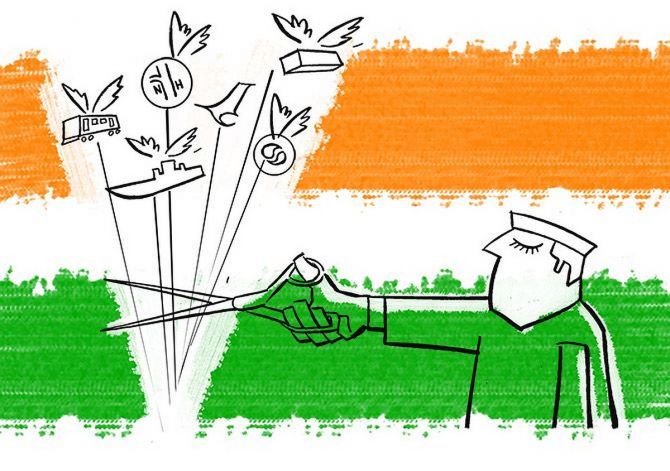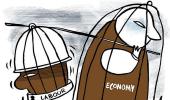Changing tracks helps. But, not taking the beaten path isn't always helpful.

This is the story of two of India's biggest privatisations - Air India and Bharat Petroleum (BPCL).
Nearly two decades after the last privatisation, a landmark divestment concluded this year when the loss-making national carrier Air India was sold to the Tatas.
This was made possible only after the government changed the track from selling 76 per cent of its stake in the national carrier to putting on block its entire 100 per cent holding as well as giving bidders an option of deciding how much debt they were willing to take over.
But in the case of BPCL, the government ignored suggestions of following its time-tested policy of putting on block 26 per cent stake along with management control, just like it had done in the case of Hindustan Zinc and Balco.
Instead, it offered its entire 52.98 per cent in the company operating in a sunset sector.
The result - just three bids came in, and two of them struggled to arrange for finances for the acquisition which going by current market value should not be less than $10-12 billion.
So, while Air India privatisation sailed, BPCL is dragging on.
Some say that if the government had offered just 26 per cent along with management control, it would have given a better value for the remainder stake once the company added value under private management.
But the biggest divestment in India's history is expected in the January-March quarter of 2022 with the country's largest insurer Life Insurance Corporation (LIC) slated to come out with an initial public offer (IPO) and list itself on the bourses.
The government currently holds 100 per cent in LIC.
Yet the biggest achievement of circa 2021 was shedding of the taboo that 'family silver' was being sold. Privatisation helps save taxpayers money gained more roots than ever before.
The year 2021 was a landmark in many aspects in terms of the government's disinvestment programme, as it saw the first privatisation in 19 years and categorizing government companies as strategic and non-strategic -- making it clear to the private sector that the government will walk the talk when it says that 'government has no business to be in business'.
Two CPSEs, Air India and Central Electronics Ltd, were privatized in 2021-- the first since 2003-04.
While Tata group bought the ailing carrier Air India for Rs 18,000 crore, Central Electronics under the Ministry of Science and Technology was sold to Delhi-based firm Nandal Finance and Leasing for Rs 210 crore.
Also, work is underway to privatise 5 CPSEs -- BPCL, BEML, Shipping Corp, Pawan Hans and NINL.
Alliance Air and three other Air India subsidiaries too would be privatised during 2022.
The tone was set by Prime Minister Narendra Modi early in February making a strong pitch for privatisation of public sector units and fiscal support to sick PSUs puts a burden on the economy and public sector units should not be run just because of legacy.
The government unveiled the new Public Sector Enterprise (PSE) policy, which had four strategic sectors in which "bare minimum" number of CPSEs will be retained and the rest would be privatised or merged or made subsidiary of another CPSE or closed down.
The four sectors are atomic energy, space and defence; transport and telecommunications; power, petroleum, coal and other minerals; and banking, insurance and financial services. In non-strategic sectors, CPSEs will be privatised, or will be considered for closure.
The policy states that NITI Aayog will recommend the CPSEs under strategic sectors that are to be retained under government control or to be considered for privatisation or merger or put under the control of another PSE or for closure.
The alternative mechanism for strategic disinvestment, comprising finance minister, road transport minister and ministers of the administrative ministries willl give final approval for the CPSEs to be retained, or privatised or merged or made subsidiary or closed down.
The budget for 2021-22 set a target of Rs 1.75 lakh crore from divestment.
Of this, Rs 1 lakh crore is estimated to come from the sale of government stake in PSU banks and insurance companies -- the majority from the IPO of LIC.
A sum of Rs 75,000 crore is budgeted from CPSE stake sale.
Asset monetisation
The government also launched a four-year (FY 2022-2025) road map for a Rs 6-lakh-crore asset monetisation plan, a large chunk of which will be through brownfield assets of central ministries and public sector entities across road, railways and power.
The sector wise target set for monetisation are road (over Rs 1.60 lakh crore), Railways (Rs 1.52 lakh crore), power transmission (Rs 45,200 crore), power generation (Rs 39,832 crore) and telecom (Rs 35,100 crore).
Privatisation
Since coming to power in 2014, the NDA government has talked about the sale of PSUs, especially loss-making ones, such as Air India.
It sought to pass off the sale of state-run entities, such as HPCL to ONGC, another PSU, as strategic sale, drawing criticism even from the CAG.
It is now trying to push privatisation as a key reform initiative and has even added state-run banks and a general insurance company to the privatisation list.
Air India, which was surviving on Rs 20 crore a day fund infusion by the government, was a case of an elephant in the room for previous governments.
After an unsuccessful attempt in 2018, when the government was selling 76per cent in the national carrier, the government in 2020 floated fresh EoI for 100 per cent sale.
But Covid delayed the privatisation plan and the sale process spilled over to 2021.
Air India had total debt of Rs 61,562 crore as of August 31.75% of this debt or Rs 46,262 crore will be transferred to a special purpose vehicle AIAHL before handing over the airline to Tata group by this month-end.
Now, work is on to monetise Alliance Air and 3 other Air India subsidiaries -- AI Airport Services Ltd (AIASL), AI Engineering Services Ltd, Hotel Corporation of India that runs Centaur hotels in Delhi and Srinagar.











 © 2025
© 2025